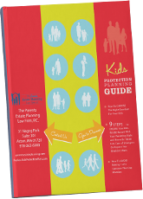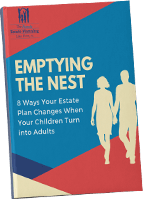
Congratulations, empty nesters! With the kids now on their own, it’s time to shift the focus back to you. As you enter this new phase of life, it’s essential to plan for your retirement years wisely. In this blog post, we’ll explore key steps to help you navigate retirement as an empty nester, while also highlighting the benefits of your estate plan in securing your financial future.
Rediscover Yourself
After years of prioritizing your children’s needs, take this opportunity to rediscover your passions and interests. Consider how you want to spend your newfound free time. Whether it’s traveling, pursuing hobbies, volunteering, or starting a new venture, now is the time to indulge in activities that bring you joy and fulfillment.
Envision Your Retirement
Visualize your ideal retirement lifestyle. What does it look like? Where do you see yourself living? What activities do you want to engage in? Use this time to test-drive your retirement dreams. Explore different possibilities and create a shared vision with your partner for this exciting phase of life. By creating this expectation of how you want to live during retirement there won’t be any avoidable financial surprises down the road.
Assess Your Finances
Review your current expenses and evaluate your financial situation. Consider any ongoing financial support for your children and factor it into your retirement plan. Work with a financial planner to determine a savings target for retirement. Maximize contributions to retirement accounts and explore additional investment opportunities to secure your financial future.
Saving tips
1. Maximize Retirement Contributions:
Individuals aged 50 or older can make catch-up contributions to retirement accounts, allowing them to contribute more than the standard limit. This can help bridge any gaps in retirement savings.
2. Boost Health Care Savings:
Health care costs tend to rise with age, so increasing savings, particularly through a Health Savings Account (HSA) if available, can help prepare for future expenses.
3. Consider Downsizing:
With the kids gone, downsizing to a smaller home can reduce mortgage debt and lower utility and maintenance costs, freeing up funds for other savings goals.
4. Reevaluate Life Insurance:
As children become financially independent, the need for life insurance may decrease, allowing for potential savings on premiums.
5. Monitor Spending:
While it’s natural to want to continue supporting children financially, it’s essential to balance this with personal savings goals. Discussing financial support limits with children can help maintain financial security for empty nesters.
Supporting your children
Many parents continue to financially support their grown children, with nearly 40% of empty nesters support their children long after they are out of the house ranging from groceries to rent and student loans. While this instinct to help is natural, it’s crucial for children to learn financial independence. It is so important to realize when dependency becomes harmful to both parties’ financial security. Collaborating with children to map out a plan for financial independence can help them become self-sufficient. Redirecting financial support towards retirement savings once children are financially secure is advised to prepare for living on a fixed income in the future.
Consider Long-Term Care
Plan for potential long-term care needs. Investigate long-term care insurance options to protect yourself and your loved ones from the high costs of professional care. Incorporate long-term care considerations into your estate planning to ensure comprehensive coverage for your healthcare needs in retirement.
Embrace Change
Understand that transitioning into an empty nest lifestyle represents a significant change in mindset and routine. While it’s natural to miss your children, embrace the opportunities and freedom that come with this new phase of life. Embrace change with optimism and excitement for the adventures that lie ahead.
Your Estate Plan
Estate planning is a critical component of retirement planning for empty nesters. It allows you to protect your assets, minimize taxes, and ensure that your wishes are carried out after you’re gone. By creating a comprehensive estate plan, you can protect your loved ones’ financial security and provide for their future needs. From wills and trusts to powers of attorney and healthcare directives, estate planning offers peace of mind and security for you and your family.
As empty nesters, retirement marks a new beginning filled with opportunities for growth, exploration, and fulfillment. By following these key steps and incorporating estate planning into your retirement strategy, you can start this journey with confidence and security. Here’s to embracing the next chapter of life with excitement!













